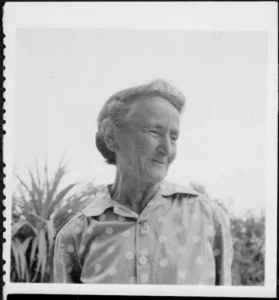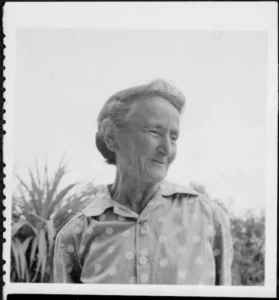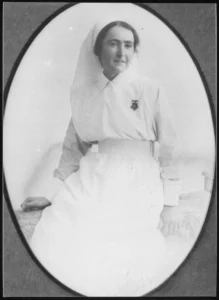Kathleen Hall (1896-1970) was born in Napier and moved to Auckland where she trained as a nurse after completing secondary school. In 1922 she was accepted by the Anglican Society for the Propagation of the Gospel to undertake missionary work in China. She arrived there in 1923 and spent the next two years in Peking studying China’s language, culture and history. She was given a teaching position in Peking Union Medical College (Xiehe), a highly advanced institution with modern facilities which was funded by the American Rockefeller Foundation and operated by British & American Protestant missions.
Hall began working in missionary hospitals in Hejian in Hebei, Datong and Anguo in Shanxi where she became the ‘sister-in-charge’ of its base hospital. By 1933 she recognised the need for medical services in rural areas and applied to the bishop for permission to establish a ‘cottage hospital’ in Songjiazhuang in western Hebei. She returned briefly to New Zealand to study midwifery but by 1934 was back in Songjiazhuang. She developed a reputation for providing medical care to rural peasants regardless of their ability to pay and worked long hours to assist them. She became known as “Dr Hall” among locals who remarked how “she was a good person who did numerous good things here”. In addition to her provision of medical care, she trained over 60 local nurses, taught literacy, donated food to the poor and provided funds to help build a new hospital.
“In this world of deep division, Kathleen Hall is a shining example of devotion, loyalty, and tenacity.”
– Miao Fan, NZ China Friendship Society
Kathleen Hall, 1896-1970. Hall, Mary :Photographs of Kathleen Hall. Ref: 1/2-181983-F. Alexander Turnbull Library, Wellington, New Zealand. /records/23114625
In 1937 Hall went back to the Anguo hospital following the Japanese invasion before returning to Songjiazhuang the following year. During the war she was largely left alone to care for hundreds of injured soldiers including the great military leader, General Lǚ Zhengcao. Though a pacifist, she believed that it was God’s will to help save the injured. She organised multiple perilous trips to Peking to purchase medical supplies while it was under occupation, personally taking her precious cargo through numerous Japanese checkpoints. Her precarious route involved first using the Japanese controlled railway network to travel to Baoding before transferring to a mule train and heading into Hebei mountains to the Jin-Cha-Ji Border Region which was still under Communist control. Hall’s bravery was particularly noted by Guo Qinglan, a nurse who worked with Hall for 50 years who was married to the legendary Indian doctor Dwarkanath Shantaram Kotnis.
Many of the supplies Hall supplied were requested by the Canadian doctor Norman Bethune who was appointed by Mao Zedong to administer medical services to the Eighth Route Army which until then had been starved of drugs and equipment. Bethune’s memory of Hall and his acknowledgment of her extraordinary tenacity was later documented in the book: Dr Bethune’s angel: the life of Kathleen Hall.
In 1939 the Japanese military conducted a punitive raid on Songjiazhuang which destroyed the mission hospital. At the time Hall was on another journey to Peking seeking to purchase further supplies. She was detained by Japanese soldiers and expelled from China. Ever determined, with the help of Song Qingling (director of the Self-Defence League and wife of Sun Zhongshan) Hall re-equipped and re-entered China via a circuitous route from Vietnam. She then travelled thousands of kilometres north back to the Jin-Cha-Ji border region where the communist resistance were running dangerously low on medical supplies. Hall then transferred to a medical unit of the Chinese Red Cross in Guiyang which was under the control of the Eighth Route Army but had to return to New Zealand in 1941 due to illness.
 “To heal the wounded and rescue the dying, she worked with selfless dedication. Her deeds in supporting the War of Resistance remains forever in history”.
“To heal the wounded and rescue the dying, she worked with selfless dedication. Her deeds in supporting the War of Resistance remains forever in history”.
-Nie Rongzhen, Marshall of Central Military Committe (Eighth Route Army)
Kathleen Hall, 1896-1970. Hall, Mary :Photographs of Kathleen Hall. Ref: 1/2-181984-F. Alexander Turnbull Library, Wellington, New Zealand. /records/22299021
In 1957 Kathleen teamed up with Joy Alley (the younger sister of Rewi Alley) and together they established the Wellington branch of the NZ China Friendship Society (NZCFS). Following her retirement from nursing in1959, she went on to sit of the executive of the Auckland branch of the NZCFS and helped establish further branches across the country. She was also a delegate of the New Zealand Peace Council for the Australian and NZ Congress for International Cooperation & Disarmament which was held in Melbourne. In 1960 she finally met Rewi Alley who had returned to NZ for a visit; despite the similar paths their respective lives had taken, until then they had never met. Alley commented that “her greatness lies in her great sacrifice, which came from the times of war and chaos. She works with ordinary Chinese people with love and warmth, which is true internationalism”. Hall was invited to visit China again that same year by Premier Zhou Enlai to attend the National Day ceremonies and returned again in 1964. In 1968, with a failing memory, she moved to a retirement home in Hamilton. Kathleen Hall died on 3 April 1970 in Te Awamutu aged 74.
Text sourced from: kathleen-hall-tom-newnham.pdf (nzchinasociety.org.nz)
Resources:
- Books in the catalogue about Kathleen Hall, 1; 2; 3
- Video about Kathleen Hall (Bilingual with English subtitle) Watch | Facebook
- Kathleen Hall documentary launch – Waikato Museum
- Who is That Person in The Photo? Chinese Life from the Past.: October 2012
- Kathleen-Hall-Booklet-2021.pdf (nzchinasociety.org.nz)



